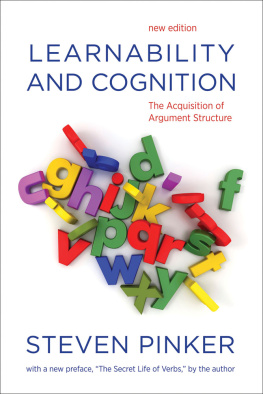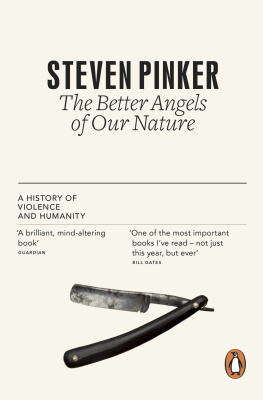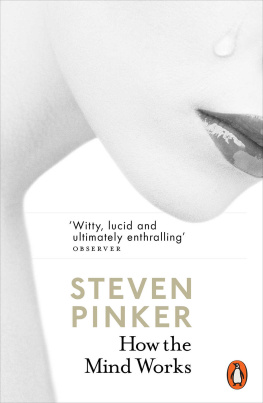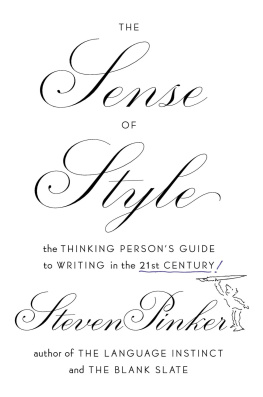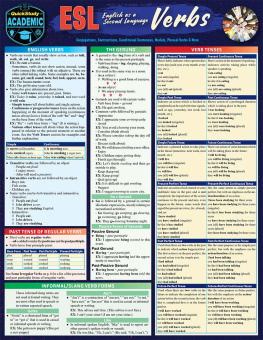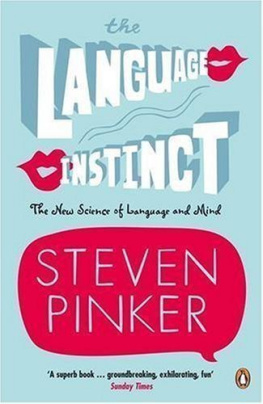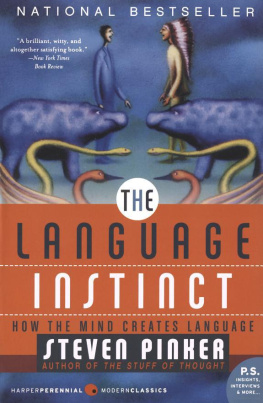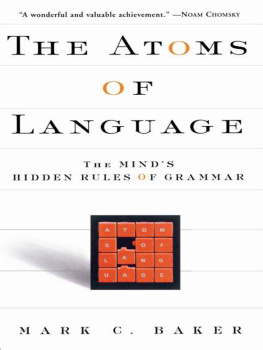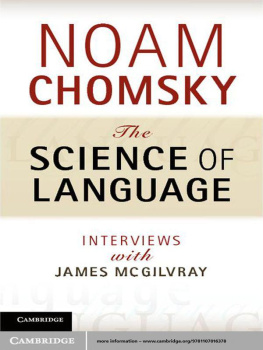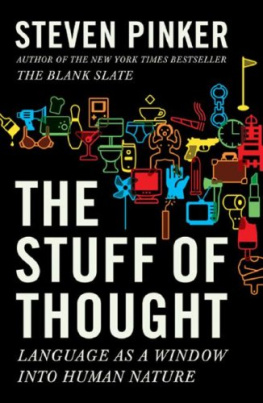
OTHER BOOKS BY STEVEN PINKER
Language Learnability and Language Development
Learnability and Cognition
The Language Instinct
How the Mind Works

Drawing of wugs by Jean Berko Gleason reprinted with the artists permission.
THE FAR SIDE 1987 FARWORKS, INC. Used by permission. All rights reserved.
False Plural (7, 6) by Trazom, reprinted with the permission of the National Puzzlers League.
Irregular Verbs: Think, Thank, Thunk drawing by Suzy Becker, reprinted with the artists permission.
ARLO & JANIS reprinted by permission of Newspaper Enterprise Association, Inc.
ZITS reprinted with special permission of King Features Syndicate.
FUNKY WINKERBEAN reprinted with special permission of North America Syndicate.
CALVIN AND HOBBES 1993 Watterson. Reprinted with permission of UNIVERSAL PRESS SYNDICATE. All rights reserved.
The Jellyfish reprinted with permission of Susan Kinsolving.
FAMILY CIRCUS reprinted with special permission of King Features Syndicate.
FOR BETTER OR FOR WORSE reprinted by permission of United Feature Syndicate, Inc.
ROBOTMAN reprinted by permission of Newspaper Enterprise Association, Inc.
Cartoon by Jeff Kaufman originally published in The New Yorker, reprinted with permission of The Cartoon Bank.
BLOOM COUNTY reprinted by permission of Berkeley Breathed.
Copyright 1999 by Steven Pinker.
Published by Basic Books,
A Member of the Perseus Books Group
All rights reserved. No part of this book may be reproduced in any manner whatsoever without written permission except in the case of brief quotations embodied in critical articles and reviews. For information, address Basic Books, 10 East 53rd Street, New York, NY 10022-5299.
FIRST EDITION
Library of Congress Cataloging-in-Publication Data
Pinker, Steven, 1954
Words and rules : the ingredients of language / Steven Pinker.1st ed.
p. cm.
Includes bibliographical references and index.
ISBN 978-0-46504-971-4
1. Language and languages. 2. Grammar, Comparative and generalVerb. I. Title.
P106.P477 1999
41521dc21 99-043013
This book is set in 11-point Fairfield.
99 00 01 02/10 9 8 7 6 5 4 3 2 1
TO THE PSYMORGS
CONTENTS
T his book tries to illuminate the nature of language and mind by choosing a single phenomenon and examining it from every angle imaginable. That phenomenon is regular and irregular verbs, the bane of every language student.
At first glance that approach might seem to lie in the great academic tradition of knowing more and more about less and less until you know everything about nothing. But please dont put the book down just yet. Seeing the world in a grain of sand is often the way of science, as when geneticists agreed to study the lowly fruit fly so that their findings might cumulate into a deep understanding that would have been impossible had each scientist started from scratch with a different organism. Like fruit flies, regular and irregular verbs are small and easy to breed, and they contain, in an easily visible form, the machinery that powers larger phenomena in all their glorious complexity.
Since the dawn of the modern study of the mind in the late 1950s, childrens language errors such as breaked and holded, which could not have been parroted from their parents speech, have served as a vivid reminder that the mind of the child is not a sponge, but actively assembles words and concepts into new combinations guided by rules and regularities. Every new theory of the mind has tried to account for this feat of childhood creativity, and perhaps the most heated debate in contemporary cognitive scienceon whether the mind is more like an artificial neural network or a symbol-manipulating computerhas used it as a benchmark.
The exploration of regular and irregular verbs will take us from the prehistoric tribes that originated our language to the brain-imaging and genesequencing technologies of the new millennium. Perhaps best of all, this case study immerses us in that mixture of mathematical beauty and human quirkiness called language. Discovering the rationale of a curious word or expression can bring the same blissful intellectual click as completing a crossword puzzle or appreciating a witticism.
For the past dozen years my research has concentrated on regular and irregular verbs, and the pleasure of coming to understand one thing really well has been surpassed only by the pleasure of working with extraordinary people who were just as consumed by the topic: the members of the Psychology of Morphology Group at MIT, the Psymorgs. Many of the big ideas in this book originated with my friend and collaborator Alan Prince of Rutgers University, and others were thought up or brought to life by former graduate students, postdoctoral fellows, and research assistants: Chris Collins, Marie Coppola, Jenny Ganger, Greg Hickok, Michelle Hollander, John J. Kim, Gary Marcus, Sandeep Prasada, Jaemin Rhee, Annie Senghas, William Snyder, Karin Stromswold, Michael Ullman, and Fei Xu. Marcus and Ullman in particular had their own big ideas that I could not have dreamed of. This book is dedicated to all of them, with gratitude and affection.
It also has been a pleasure to work with Harald Clahsen, Richard Wiese, and Iris Berent on their ingenious studies of German and Hebrew. Hilary Bromberg and Cyrus Shaoul, former undergraduates at MIT, made important contributions in their senior research projects. Thanks go as well to other collaborators, especially Ursula Brinkmann, Suzanne Corkin, John Growdon, Walter Koroshetz, T. John Rosen, and Joseph Shimron.
I am happy to acknowledge the expert help of Patricia Claffey, the librarian of the Teuber Library in the Department of Brain and Cognitive Sciences at MIT, and of my assistants, Allison Baker, Sonia Chawla, and Marie Lamb.
I thank my editors, John Donatich of Basic Books, and Toby Mundy of Weidenfeld and Nicolson, for their invaluable encouragement and advice on every aspect of the book, and Michael Wilde for his excellent copyediting. I am particularly indebted to the friends and colleagues who generously provided detailed comments on an earlier draft: Iris Berent, Alfonso Caramazza, Judith Rich Harris, David Kemmerer, Samuel Jay Keyser, Beth Levin, Gary Marcus, Sandeep Prasada, and Michael Ullman. My agent, John Brockman, conceived the Science Masters series in which this book is published, and I thank him for his advice and his efforts on my behalf.
I am grateful for the constant encouragement and support of my extended family, the Pinkers, Boodmans, and Subbiah-Adams. I am especially grateful to my wife, Ilavenil Subbiah, who designed the illustrations, commented on the manuscript, offered advice on every aspect, and was always there with love and support.
This research was funded by the National Institutes of Health (grant HD-18381), the National Science Foundation (BNS 91-09766), the McDonnell-Pew Center for Cognitive Neuroscience at MIT, the German-American Collaborative Research program of the American Council of Learned Societies and the Deutscher Akademischer Austauschdienst, and MITs Undergraduate Research Opportunities Program.

L anguage comes so naturally to us that it is easy to forget what a strange and miraculous gift it is. All over the world members of our species fashion their breath into hisses and hums and squeaks and pops and listen to others do the same. We do this, of course, not only because we like the sounds but because details of the sounds contain information about the intentions of the person making them. We humans are fitted with a means of sharing our ideas, in all their unfathomable vastness. When we listen to speech, we can be led to think thoughts that have never been thought before and that never would have occurred to us on our own. Behold, the bush burned with fire, and the bush was not consumed. Man is born free, and everywhere he is in chains. Emma Woodhouse, handsome, clever, and rich, with a comfortable home and happy disposition, seemed to unite some of the best blessings of existence. Energy equals mass times the speed of light squared. I have found it impossible to carry the heavy burden of responsibility and to discharge my duties as King without the help and support of the woman I love.
Next page


